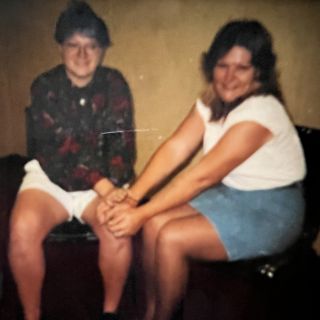FORGIVENESS- How Can We Forgive What Seems Like an Unforgivable Act? Mary Bailey’s mother tried to frame her for murder. Mary still loves her mom.

KEY POINTS-
- Mary Bailey was only 11 years old when she was convinced by her mother to kill Mary’s abusive stepfather.
- Mary learned to forgive her mother for trying to frame her for murder, she chose to do this for herself.
- Mary hopes the people her story might help far outweigh those who may judge her or her mom adversely.
- Mary believes anger toward others is like "drinking poison and expecting the other person to die."
Recently, I was approached to write a movie based on the real-life experiences of Mary Elizabeth Bailey, a woman who, when 11 years old, was convinced by her mother to kill Mary’s abusive stepfather. While drawn to the characters' psychology in the story, I was initially hesitant to take on the project since the film's main subject is still alive and even wrote a book about her experiences.
While ripped from the headlines biopics are popular, I didn’t want to write a movie that would be more akin to not being able to look away from a trainwreck as much as I wanted to explore the personalities behind the incident and then allow viewers to find some hope from, and reverence for, what transpired.

Upon meeting Mary, I couldn’t have been more impressed, which surprised me. I’d mistakenly thought that someone who suffered through so much trauma at such an early age might be broken as an adult. I, myself, was traumatized by extremely abusive parents, resulting in years of self-abuse and self-harm. I suppose, in a way, this made me and Mary kindred spirits. Perhaps I was meant to write this movie all along.
I wondered why Mary decided to go public with a story that might cause others to judge her even today. Mary shared, “My story has touched many lives, and I have hundreds of messages from people who needed to hear my story to face their own tragic experiences.”
Mary assured me she no longer fears being judged. “Worry only steals joy away from tomorrow. I realize there are people who may have negative things to say, but the number of people my story will help for many years to come far outweigh those who may judge me.”
I was won over by Mary’s kind nature and gentle demeanor. When she speaks of the trauma, demons, and abusers of her past, she does so with grace and even generosity. “I did not fully understand the magnitude of what had taken place,” Mary told me, “My love for my mother never wavered.”
Mary explained that, over the years, she became angry as she learned the truth of what really happened when she was younger, but never stopped loving her mom. “She went through a very difficult and abusive situation. She made poor choices as a result. The truth is we have all done things in life we aren't proud of.”
I asked Mary what it was like for someone like me to take her story, which is raw and real, and give it a cinematic view—one that sometimes takes a little creative license for the sake of storytelling. Mary believes it's important that the story not only be told in a way that makes it palpable for audiences but that ultimately offers some hope and a way forward for those watching who might be dealing with their own traumas (whether past or present).

Even after Mary’s mother went to prison, she was still combative and untrustworthy upon her release 10 years after being found guilty for the death of her husband (Mary’s stepfather). It was only just before her mom's passing—decades after serving her sentence—that Mary and her mother were able to finally make peace with one another. And so much of that is because of Mary’s faith in God and her decision not to let the past rule—or ruin—her present.
Perhaps Mary tells it best, “Sometimes we have to wait a long time to hear the words we long for. Sometimes, we never do. But anger and resentment towards a person is truly like drinking poison and expecting the other person to die.”
Throughout the process of writing and making the film, I was able to get to know Mary on a deeper level. Despite all the childhood trauma she endured, I remain fascinated with Mary’s resilience to live as a happy person.
“I believe that healthy boundaries have to be set to process what kinds of traumas you may have suffered in your past,” says Mary when offering advice to others who might be haunted by family secrets and or tragedies.
“People make choices, and many times they do not think of the impact these choices will have on their loved ones,” suggests Mary. “Ask yourself, are these individuals remorseful? Are they open to discussing how this has affected you mentally, emotionally, and or physically? And even if they are not, perhaps a family counselor can be the key to taking the steps to either address these issues or accept them and let them go.”
- Questions and Answers
- Opinion
- Story/Motivational/Inspiring
- Technology
- Art
- Causes
- Crafts
- Dance
- Drinks
- Film/Movie
- Fitness
- Food
- Spiele
- Gardening
- Health
- Home
- Literature
- Music
- Networking
- Other
- Party
- Religion
- Shopping
- Sports
- Theater
- Wellness
- News
- Culture
- War machines and policy

